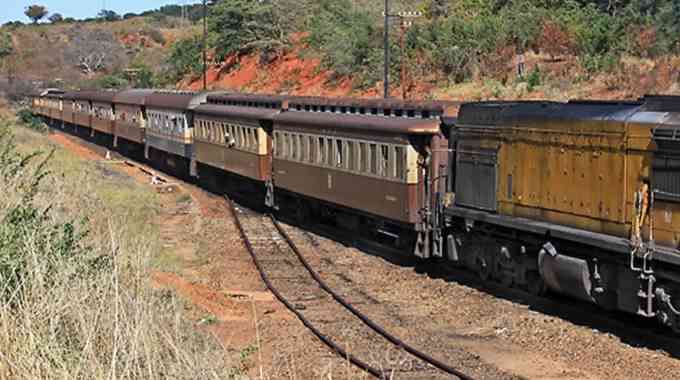
HETHIMEX, a Belgian corporation, has given embattled National Railways of Zimbabwe (NRZ) 30 days to pay its US$9,6 million debt or face legal action, the Zimbabwe Independent can report.
In 2003, Hethimex and the state-owned rail company entered a deal allowing the parastatal to purchase parts for general motor locomotives using a revolving credit facility.
According to a report on the situation of the NRZ provided to the parliamentary committee for transportation recently, the parastatal has failed to make payments on the debt, which has forced Hethimex to take urgent action.
“NRZ had been paying and continued to receive the spares, however, when the country re-introduced the ZWL (Zimbabwean dollar), most of the company’s clients opted to pay in ZWL resulting in NRZ failing to service the account,” the report reads in part.
“The debt at one stage ballooned to US$12 million and the management tried to reduce the debt and paid US$2,5 million in instalments. Due to non-payment of instalments by NRZ in 2022, Hethimex decided to demand full payment of the US$9,6 million outstanding and failure of which they opted to have the matter taken to arbitration at a court in London.”
The government agreed to bail out NRZ through a loan and served as the contract’s guarantor but the government has not kept its promise, and on January 6 2023, Hethimex issued a 30-day notice of arbitration.
“Since the agreement was guaranteed by the government and if the matter was allowed to proceed through arbitration, it means that any Zimbabwean government asset would be attached to settle this debt.
“NRZ then appealed to the government to assist with the payment of the debt in order to avoid the embarrassing situation of having government assets attached. Though Treasury agreed to advance a loan to NRZ to clear this debt, they have defaulted,” the report said.
- NRZ demands stiffer penalties
- Sadc railways commemorate safety week
- Interview: ‘Locomotive tourism’ back in style
- NRZ loses US$17k property to theft, vandalism
Keep Reading
The burden of the debt—the principal amount plus interest—is one of the issues making it difficult for the parastatal to acquire finance for recapitalisation.
Due to its crippling international debts, it has been unable to move through with potential capitalisation arrangements.
For instance, the NRZ owes €2,7 million to the Department of International Development in Central Africa. According to the report, the monies were used to start electrifying the Dabuka to Harare railway line in 1983.
Due to the theft of copper cables and acts of vandalism, the electric line was rendered useless and was subsequently deactivated.
Natexis Banque, a French-based lender, is owed €956 398 by the parastatal. A total of 30 electric locomotives that ran along the Dabuka to Harare railway line were purchased in part with money from the facility.
Vandalism forced the decommissioning of the line.
German investment and development bank Kreditanstalt Fur Wiederaufbau is owed about €4,05 million. The 30 locomotives were also purchased with the help of the loan.
The New Limpopo Bridge Project Investment is also owed around US$3 million by the NRZ.
The New Limpopo Bridge Project Investment gave the NRZ US$7 million and US$3 million for working capital. NRZ made a $7 million payment.
However, the US$3 million loan's principal balance as well as interest costs are still unpaid.
Interim Solution Resources is owed about R68,697 million (US$3,4 million). The loans were used to pay overdue transportation and equipment hire fees.
Additionally, the NRZ owes Mozambique Railways (CFM) a total of US$4,96 million. These fees apply to wagons and tarps that transport goods to Zimbabwe. The NRZ has promised to pay off the debt with 25% of its revenue.
The NRZ has since asked the government to take over its debt.
The state rail company despite the debts has been scouting for a number of investors and strategic partners but the Diaspora and Infrastructure Development Group (DIDG) US$236 million lawsuit will likely dent the rail company’s prospects of securing international funders.
The lawsuit according to financial experts will increase NRZ’s risk in the eyes of funders considering that the state-owned rail company is already battling political risk associated with being a state enterprise in Zimbabwe.
Cabinet terminated the multi-million dollar contract last year arguing DIDG lacked the financial wherewithal to implement the project. But to date the Transport and Infrastructure Development Ministry has been made aware of the ramifications associated with unprocedurally terminating a multi-million dollar transaction.
This publication is informed that going forward it is going to be difficult for the government to secure a reputable international funder for NRZ considering the US$236 million claim already in its neck.
International financiers, for instance China Eximbank, have already expressed reservations around the impact of the DIDG claim.
Regional banks, namely Afreximbank, Nedbank, Absa, Standard Bank, CBZ, Ecobank and TDB, together with asset and wealth management firms that include Old Mutual, Imara Asset Managers, National Social Security Authority (Nssa), Harith Pan African Infrastructure Development Fund, had already mobilised over US$1 billion to finance the project under the DIDG arrangement.






